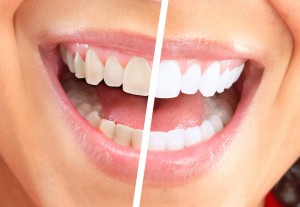Teeth whitening can be a very effective way of lightening the natural colour of your teeth without removing any of the teeth surface. It cannot make a complete colour change, but it may lighten the existing shade.
Why would I need my teeth whitened?
There are a number of reasons why you might get your teeth whitened. Everyone is different; and just as our hair and skin colour vary, so do our teeth. Very few people have brilliant-white teeth, and our teeth can also become more discoloured as we get older.
Your teeth can also be stained on the surface by food and drinks such as tea, coffee, red wine and blackcurrant. Smoking can also stain teeth.
‘Calculus’ or tartar can also affect the colour of your teeth. Some people may have staining under the surface, which can be caused by certain antibiotics or tiny cracks in the teeth which take up stains.
What does tooth whitening involve?
Professional bleaching is the most usual method of tooth whitening. Your dentist will be able to tell you if you are suitable for the treatment, and will supervise it if you are. First the dentist will put a rubber shield or a gel on your gums to protect them. They will then apply the whitening product to your teeth, using a specially made tray which fits into your mouth like a gum-shield.
The ‘active ingredient’ in the product is usually hydrogen peroxide or carbamide peroxide. As the active ingredient is broken down, oxygen gets into the enamel on the teeth and the tooth colour is made lighter.
How long will my teeth stay whiter?
The effects of whitening are thought to last up to three years. However, this will vary from person to person. The effect is less likely to last as long if you smoke, or eat or drink products that can stain your teeth. Ask your dentist for their opinion before you start the treatment.

